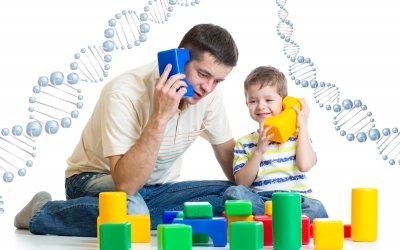- Latest news▼
-
08:43, April 26 Enzymes that convert different blood groups into first group are discovered

-
19:41, April 25 Children’s Hospital Los Angeles and International Center of Professional Development Allergy/Immunology Conference

-
17:31, April 25 JAMA: patient grew long, curly eyelashes because of chemotherapy

-
11:08, April 25 Mpox epidemic declared in Republic of the Congo

-
08:31, April 25 OU: quitting smoking 4 times more likely to cure laryngeal cancer

-
01:20, April 25 Paralyzed man in China writes hieroglyphs using neural implants placed in his brain

-
15:11, April 24 Zombie deer disease possibly linked to hunters’ deaths

-
12:27, April 23 Appetite: Scientists found out the secret to the appeal of large portions of fast food

-
10:33, April 23 Scientists test new approach to fighting viruses

-
08:38, April 23 Ketamine may help with postpartum depression

-
22:12, April 22 Unhealthy amount of sugar found in baby food products of a well-known brand

-
19:41, April 22 Air pollution puts health of more than 1.6 billion workers globally at risk

-
17:25, April 22 Scientists found baked goods and lack of sleep to be more dangerous than alcohol

-
16:02, April 22 342 cases of measles recorded in Armenia so far in 2024

-
15:29, April 22 BrainStimulation: electrical brain stimulation alleviates anxiety and depression in the elderly

All materials
Genetically speaking, babies are more like their dads

You may have inherited your mother’s eyes, but, genetically speaking, you use more DNA passed down from your father. That’s the conclusion of a new study on mice that researchers say likely applies to all mammals.
We humans get one copy of each gene from mom and one from dad (ignoring those pesky sex chromosomes) – that hasn’t changed. The same is true for all mammals. But that doesn’t necessarily mean that mom and dad genes are equally active in creating who we are.
Researchers now report that thousands of mouse genes show parent-specific effects, and that on balance, the scales are tipped in favor of dads. Studying whether this imbalance exists in humans could give scientists insights into the causes of inherited conditions like diabetes and heart disease.
Humans, mice and many other animals shared a common ancestor some 80 million years ago; therefore, our set of genes are highly alike. Further, when mice pass their genetic material down to their offspring, the manner in which genes are turned on or off is also similar to humans.
The study looks at gene expression – that is, genes’ level of activity in producing RNA, which is the molecule that then goes on to create proteins and basically make the body function. In this study, scientists worked with a population of mice called the Collaborative Cross, which is the most genetically diverse population of mice in the world. These mice were specifically bred to mimic the genetic diversity found in human populations.
Scientists interbred three strains of these mice to create nine different types of offspring. When these mice reached adulthood, scientists measured the level of gene expression in a variety of bodily tissues. They then quantified how much gene expression was derived from the mother and the father for every single gene in the genome.
Overall, they found that most genes showed parent-of-origin effects in their levels of expression, and that paternal genes consistently won out. For up to 60 percent of the mouse’s genes, the copy from dad was more active than the copy from mom. This imbalance resulted in mice babies whose brains were significantly more like dad’s, genetically speaking.
The researchers believe the same is likely true in all mammals. “We now know that mammals express more genetic variance from the father,” says Pardo-Manuel de Villena. “So imagine that a certain kind of mutation is bad. If inherited from the mother, the gene wouldn’t be expressed as much as it would be if it were inherited from the father. So, the same bad mutation would have different consequences in disease if it were inherited from the mother or from the father.”
Follow NEWS.am Medicine on Facebook and Twitter
- Video
- Event calendar
- Children’s Hospital Los Angeles and International Center of Professional Development Allergy/Immunology Conference
- First Armenian-German Conference entitled “Heart Failure Spring School”
- Allogeneic bone marrow transplant in case of hematological malignancy performed in Armenia for first time
All materials
- Archive
- Most read
month
week
day
- Scientists found baked goods and lack of sleep to be more dangerous than alcohol 1017
- Next pandemic likely to be triggered by flu - scientists 988
- 342 cases of measles recorded in Armenia so far in 2024 946
- Scientists develop new method to safely stimulate immune cells to fight cancer 805
- Cognitively stimulating jobs in midlife could lower dementia risk in old age, study finds 803
- Blood test can determine who is at risk of developing multiple sclerosis - scientists 796
- Unhealthy amount of sugar found in baby food products of a well-known brand 742
- Ketamine may help with postpartum depression 742
- Air pollution puts health of more than 1.6 billion workers globally at risk 735
- Appetite: Scientists found out the secret to the appeal of large portions of fast food 734
- BrainStimulation: electrical brain stimulation alleviates anxiety and depression in the elderly 733
- Scientists test new approach to fighting viruses 719
- Zombie deer disease possibly linked to hunters’ deaths 647
- Mpox epidemic declared in Republic of the Congo 446
- Paralyzed man in China writes hieroglyphs using neural implants placed in his brain 402
- Find us on Facebook
- Poll





